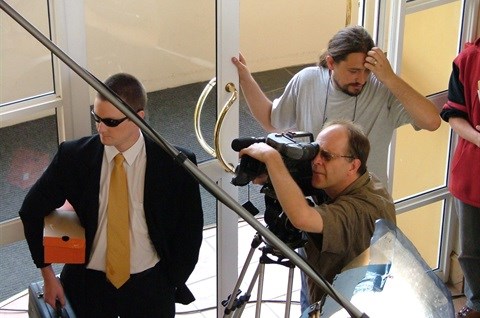In today's overcrowded, fast-moving marketplace, your company is judged, accepted and paid according to how it presents, re-presents and projects itself. Film makes a powerful statement. With so many artists conspiring to enhance your filmed message, your corporate identity virtually lifts off the page.
Film is unquestionably the most sophisticated, multi-level, corporate communications instrument of the 21st century. Being a collaborative art, film seamlessly integrates every conceivable media element... filmed images, computer generated graphics, music, sound effects, voice, performers and more.
Film and social media
As a key component of content marketing, film can be linked in a click to variety of delivery platforms such as YouTube, Facebook, LinkedIn and of course your website. As bandwidths improve, so does film more effectively drive your target market to your website, the starting point for most B2B transactions.
Social media platforms are constantly adapting to the power of video. YouTube alone has over a billion users, with billions of viewings every day. The popular domain Facebook is currently preparing for what it terms 'video marketing'. This will open up a whole new range of audio-visual products of varying styles and durations.
In terms of viewing hours, the trend is away from mainstream television towards internet-based content such as your computer screen, tablet or cell phone screen. These are all rapidly growing viewing platforms. A creative video is easily circulated, capturing countless eyeballs as it criss-crosses cyberspace. If your video captures the imagination of your target audience, it could even go viral, vastly increasing your exposure.
A curious transaction
Placing the order for a corporate film remains one of the most curious transactions in the world.
You, the client, put good money on the table without having a clue as to what you're going to get, and in truth neither does the producer. The transaction is often based on good faith and 'gut feel' assessment from both sides.
How then do you select a production house?
The process is similar to commissioning any artist. You, the client, need to communicate your intention to the artist, ensure that you have been heard, then let go of the precise outcome. This allows creative innovation from which a real return on investment will arise.
This article is aimed at empowering the executive to select and interact optimally with a production house or producer. Whether the film is a five-second clip, a 30-second commercial, a seven-minute corporate video or a two-hour training film, the production principles remain fundamentally the same.
The producer: Conductor in the orchestra
Today with high definition video being available on most cameras and cell phones, the mystique of video has fallen away. The real mystery is how so many creative skills come together to orchestrate a positive viewing experience. The process begins with concept and script, followed by video recording. Thereafter the film enters a deeper, more complex creative process.
The producer, often the writer, coordinates all creative resources and controls the budget, which itself drives the creative process. It is this producer who weaves these creative resources into the fabric of your final narrative, and who collaborates with many artists on many level. This ensures that every dollar spent contributes to enhanced narrative impact with good retention of information.
This is a high art, and there is no substitute for experience.
Multi-layered skills
The producer skills necessary to a successful outcome are multifold. They include intelligent communication with you the client, a good grasp of your business, a positive interaction with many artists, a technical and aesthetic understanding of film, financial management, writing ability and team leadership. The producer needs to be able to manage the entire film process from pre-production to post-production through to final delivery.
Boardroom briefing
When a large corporate operation briefs a production house, the initial venue is often the boardroom with relevant directors present. This may include the CEO, CFO, CIO or HR.
Over the last 20 years I have often witnessed deep rifts emerge in top management when negotiating objectives of the filmed communication. Successful end products result from executives having discussed and brainstormed their key objectives.
To the right target market, a corporate film projects a powerful statement of identity, so it makes sense for the company to speak with one clear voice.
Choosing a production company
The wisdom of your decision to commission a specific film company can be based on only two reliable indicators: a) previously satisfied clients and b) how you evaluated the producers' performance during meetings.
A visit to the intended company's website is always a good idea, this being their shop-window in cyberspace. Look at the client list and if some of the Top 100 companies are among them, this is a fair indication that the team has creative, technical and business competence.
During your search you might meet a few producers. Listen to how they intend meeting your needs. Are they good listeners and do they ask intelligent questions about your operation? Do they have a creative concept relevant to your operation?
If their credentials are good, and their creative explorations excite you, then you might be onto something.
Membership affiliation to one or more accredited organisations is another plus and gives you, the client, some recourse should a need arise. A show-reel is certainly worth viewing, whilst remembering these are often designed to impress.
The final decision always comes down to how you read human calibre and competence. An art in itself.
Budget
The cost of a film is generally determined by the level of design, talent and equipment.
You may choose to ask the production company for three creative/cost options. I've learnt to keep it simple and if asked, I offer Bronze, Silver and Gold cost options, detailing what each option entails. Ignoring Bell Curve extremes, most professionally produced corporate films range from four to well over six figures. Cost has little to do with duration. A 30-second commercial may cost a million due to enhanced production value, whilst a 30-minute 'talking head' may cost a few thousand.
Once you approve of the concept, payment is due. A 50% deposit is the industry standard, and final payment made only once you are completely satisfied with the finished product.
Provided you are dealing with a creative production company with a good track record, the rule of thumb is to allocate the best budget you can afford, knowing you will get the best bang for your buck.
'Dollars on the screen' as goes the American saying.
The production process
The key steps are fairly predictable, and in essence include the initial meeting, presentation of concept and budget, submission of the script for approval, the shoot, and then post-production. The latter involves editing, computer graphics, and the mixing of emotionally appropriate music, voice commentary and other effects, each element further amplifying the all-important narrative.
A force in marketing
Film can start and grow a brand quicker than any other form of content marketing. It speeds up buying decisions and has the highest recall value, especially if it makes an emotional impact.
Film also gives companies a significant competitive advantage when submitting tenders or when launching a new product or service. It is the safest, fastest and most impressive medium to take guests on a virtual tour of an otherwise dangerous or inaccessible facility like a deep mine or nuclear facility.
Should the opportunity present itself, your film can be broadcast on national television or featured on lesser screens such as hotels, retail or related public domains.
Finally having developed your company's story, don't overlook the benefits of partnering with a good producer, especially if you are a small enterprise and cannot afford the luxury of an advertising or PR agency. Talented producers can be co-opted to play a cost-effective, creative role in furthering your content marketing objectives.









































